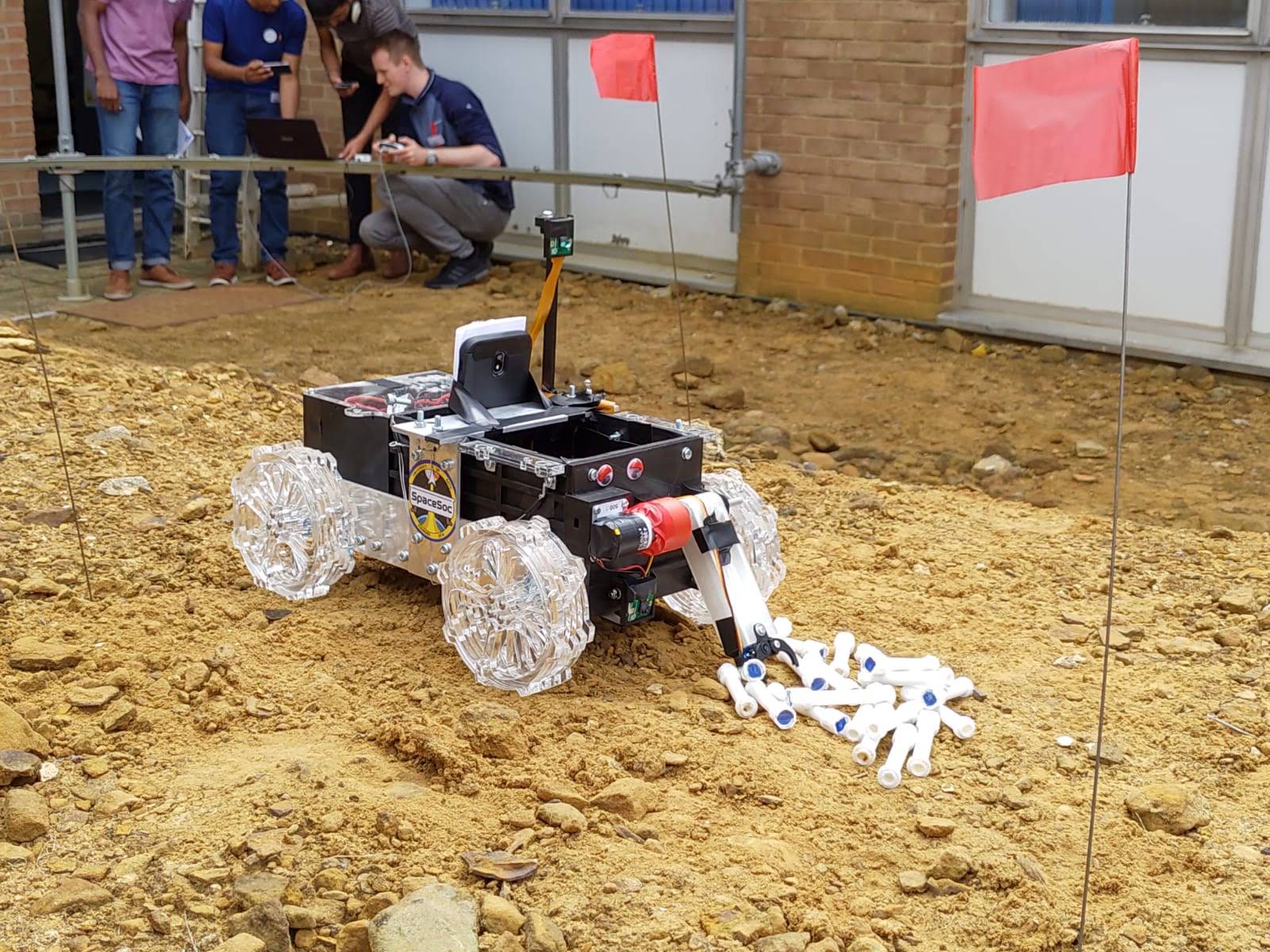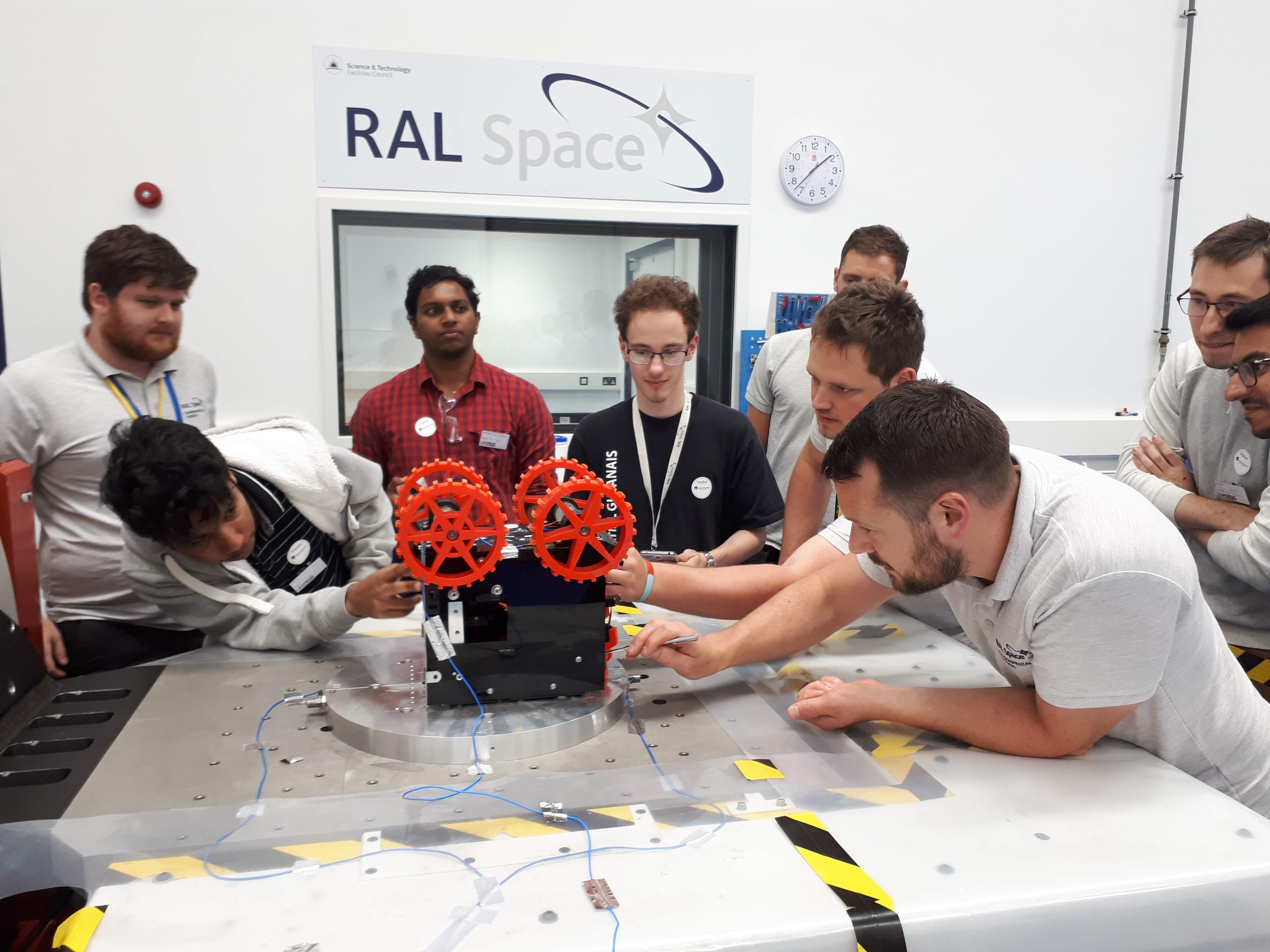 Six student teams consisting of over 60 participants from across the UK reached the final stage of the Olympus Rover Competition, which saw them design, construct and test a mini-Mars rover over a period of 9 months. The challenge is based on a potential future robotic mission to collect samples of rock from the Martian surface. The designs had to meet a strict set of engineering and science requirements.
Six student teams consisting of over 60 participants from across the UK reached the final stage of the Olympus Rover Competition, which saw them design, construct and test a mini-Mars rover over a period of 9 months. The challenge is based on a potential future robotic mission to collect samples of rock from the Martian surface. The designs had to meet a strict set of engineering and science requirements.
The rovers were put through their paces on terrain similar to that found on the Mars at the RAL Space robotics trials area and had to withstand the stresses and strains of launch in the vibration test facility.
Rovers lost wheels in their attempts to scale the rocky terrain of the Mars yard, others lots nuts and bolts and even a whole robotic arms on the vibration table. The rovers demonstrated some innovative design features including a fully automated collection system and the RAL Space vibration table tested a wooden structure for the first time.
Team Bath Roving from the University of Bath took first place in the competition with their 4-wheeled design, making use of a servo-operated robotic arm to collect sample canisters from the “Martian surface". Varun Chhabra, from the winning team said, “Our team has a diverse range of academic backgrounds with a common interest in space. Participating in the competition has brought that interest to life and has given us all a valuable taste of real space missions. Taking part has been a fantastic opportunity to gain new skills, and develop our team working abilities, while also networking with fellow students and industry professionals.
We were very pleased to see all our hard work to design and build our rover pay off and are humbled by our success against some excellent teams. This was our third consecutive year in the competition, with the team developing greatly since we first took part. We hope to continue to learn from our experiences and put together an equally successful team for next year. Finally, we would like to thank UKSEDS, RAL Space, and all other sponsors for organising the UKSEDS Olympus Rover Trials."

Other awards went to Team Furiosity from Cranfield University for building the most innovative robot and for impressing the industry panel of judges at an early design review. Team Ares from Imperial College London were recognised for building a rover with autonomous capabilities and Team Southampton Spaceflight from the University of Southampton were praised for their rover-related outreach programme to encourage more young people to study science subjects at school.
Other teams who made it through to the final round of the competition came from the Universities of Manchester (Team ManSEDS) and Cranfield (Team The Claw).
“Having the chance to apply and test knowledge from your degree is an essential part of preparing students for working in industry" says Sam Bond, Vice Chair of UKSEDS, “The competition is structured to mirror the real development process of modern space missions, giving students a real taste of what working in the space industry is like. Plus, robots are cool!"
“The sophistication and reliability of the robots really exceeded our expectations this year, the teams embraced this extremely hard challenge and showed us how it should be done." says Andrew Bacon, industrial advisor to the project from Thales Alenia Space in the UK.
Aron Kisdi, AI Engineer at GMV said, “It was impressive to see so many teams successfully completing this difficult challenge! Everyone cheered when the first sample container got picked up!"
Professor Chris Mutlow, Director of RAL Space said, “Space is not for the faint hearted. Challenges occur at every stage of the process of getting a mission off the ground and operating somewhere in the solar system. Learning how to deal with this, by coming up with inventive solutions, and having the tenacity to try again is incredibly valuable experience and are something we look for when recruiting scientists and engineers. We're delighted to be able to open our facilities up once more for students across the UK to get to grips with the rigours of testing for space and put into practice the skills we need in the space industry."
The Olympus Rover Competition is organised by UKSEDS, the UK's student space society and its partner, GMV and sponsors, RAL Space, Thales Alenia Space in the UK and FAIR-SPACE Hub. Additional support is provided by Oxford Space Systems and Open Cosmos. Inspired by past and future missions from NASA and the European Space Agency, the competition challenges undergraduate students to solve engineering problems, using industry-standard techniques, tools and processes. More information on the competition can be found at:http://robotics.ukseds.org/
Top image: Rover on the Robotics Test Yard for the Olympus Rover Competition 2019. Credit: UKSEDS
Bottom image: Rover being fixed to the vibration table. Credit: RAL Space
